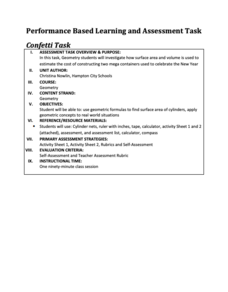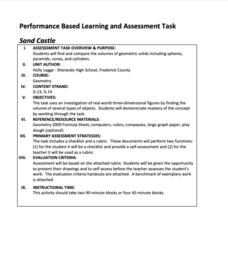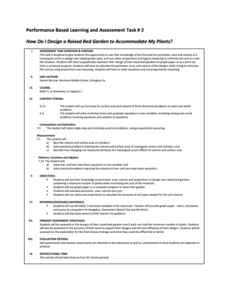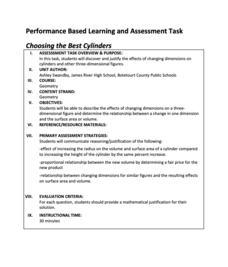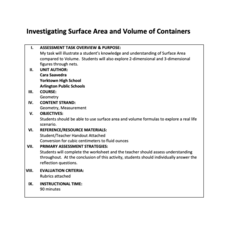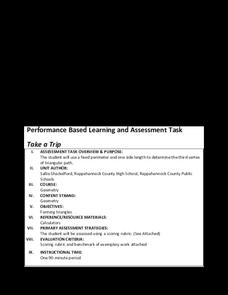Flipped Math
Angle Pairs
Complement the class by identifying pairs of angles. With a vocabulary lesson, pupils learn the names and definitions of special angle pairs including adjacent, vertical, complementary, supplementary, and linear pairs. Using the...
Flipped Math
Measuring Angles
An informative presentation shows pupils how to name and measure angles. Scholars revisit the different types of angles and their definitions and use their knowledge of what an angle bisector is to solve algebraic problems. At the end,...
Flipped Math
Points, Lines, and Planes
Geometry is more than just vocabulary. Pupils learn the basic geometric definitions and how to identify and name points, lines, and planes. Though the first lesson is packed with related vocabulary, scholars experience four postulates...
Gfletchy
Fill ‘er Up
Drink in a lesson on volume. Individuals first view a video clip where a conical cup is used to pour water into a water cooler jug. Using provided dimensions of the cup and the jug, they estimate the number of cups required to fill the...
Teach Engineering
Trust in the Truss: Design a Wooden Bridge
Obviously, a sturdy bridge is the desired outcome. Pupils select from one of four different types of truss bridges, then construct a model of the bridge from craft sticks and glue, making sure that it satisfies certain constraints. They...
Teach Engineering
Doing the Math: Analysis of Forces in a Truss Bridge
Join together to investigate truss joints. Scholars learn how to analyze forces at truss joints to determine the strength of truss bridges. They apply the "method of joints" in calculating the tension and compression forces at each joint...
EngageNY
Volume and Cavalieri’s Principle
Take a slice out of life. The ninth section in a series of 23 introduces classmates to Cavalieri's principle using cross sections of a cone and stacks of coins. Class members participate in a discussion using pyramids and how Cavalieri's...
EngageNY
Curves from Geometry
Escape to investigate hyperbolas. Pupils take a look at what happens to the elliptical orbital path of a satellite that exceeds escape velocity as the opener to the eighth lesson plan in a unit of 23. Scholars analyze basic hyperbolas...
EngageNY
Curves in the Complex Plane
Go around and around on the complex plane. The sixth lesson in a 23-part unit reviews representing numbers in the complex plane. Pupils graph numbers with equal moduli and notice they represent a circle. They continue to explore complex...
EngageNY
Curves from Geometry
Take a another look at ellipses. The seventh segment in a series of 23 in a Precalculus module continues to investigate the graph and equation of an ellipse from the previous lesson. Scholars investigate the fact that the sum of...
Radford University
Surface Area of Boxes
Explore surface area out of the box. Pairs investigate surface area by measuring two boxes and calculating the area of each side. Classmates trace one of the boxes onto butcher paper and create a net with the same area. Groups then...
Radford University
Alpaca Lunch
Feed the need for knowledge. Future mathematicians first consider how the lateral area of a rectangular prism relates to its volume. They then design a container for alpaca food that has the maximum volume possible from a given sheet of...
Radford University
Confetti Task
Using the net of a can, learners develop formulas for the surface area and volume of a cylinder. They then apply their formulas to solve problems about a cylindrical container used to disperse confetti.
Radford University
Sand Castle
Don't let the task slip through your fingers like sand. Scholars design sand castles using hemispheres, pyramids, cones, and cylinders of different sizes. They calculate the volume and surface area and consider how changing the...
Radford University
How Do I Design a Raised Bed Garden to Accommodate My Plants?
Give plants the best place to grow. Given constraints on plant spacing, pupils design a raised bed garden using graph paper, then calculate the perimeter, surface area, and volume. They use the provided costs of lumber and soil to...
Radford University
Coal Silo Design Task
The coal is mined. Now what? Scholars design a coal silo that stores mined earth using at least two different three-dimensional shapes. They calculate the volume, determine the amount of mined earth produced in a day, and find the amount...
Radford University
Exploring Coal Pillar Mining
Coal mines can be a gold mine of math applications. After reading some basic information on coal mining, learners draw blueprints of a coal pillar in the shape of a composite figure. They find the volume of material from the coal pillar...
Radford University
Choosing the Best Cylinders
Don't be fooled: the taller glass doesn't always hold the most. Given the dimensions of different cylindrical containers for beverages and popcorn, pupils calculate the volumes. They see how changing the dimensions affects the volume and...
Radford University
Lemonade Business - Investigating Surface Area and Volume of Containers
Boost lemonade sales by using the perfect container. For a given volume, future entrepreneurs design a container that will have the least surface area and by extension, the least cost of material. They create a two-dimensional net of...
Radford University
Swimming Pool Dilemma
Different shape, same volume—that's quite a challenge! Scholars design a pool for an imaginary client using three-dimensional figures. They must then create a second pool for another client with the same volume, but using different shapes.
Radford University
Take a Trip
Leave all your travels needs to the math department. Pupils apply knowledge of triangles to identify a triangular path for a traveler to take. They use a given distance for the second leg of the trip and a constraint on the length of the...
Radford University
Triangle Inequality Task
Not all triangles are created equal. A simple hands-on activity has learners investigate the side lengths of triangles. They use pipe cleaners to determine whether triangles of given side lengths can exist and then use the results to...
Radford University
Escape from the Zombie Apocalypse - Exploring Quadrilaterals through Google Maps and Google Earth
Prepare for the zombie apocalypse ... by studying quadrilaterals? Given a map of an imaginary town, scholars identify quadrilaterals created by streets. They then use Google Earth and Google Maps to find parallelograms, rectangles,...
Radford University
Where Should We Sit?
Where's the best seat in the house? Given a diagram of a movie theater, pupils determine the best seats based on the viewing angle. They use inscribed angles to justify their choices.













